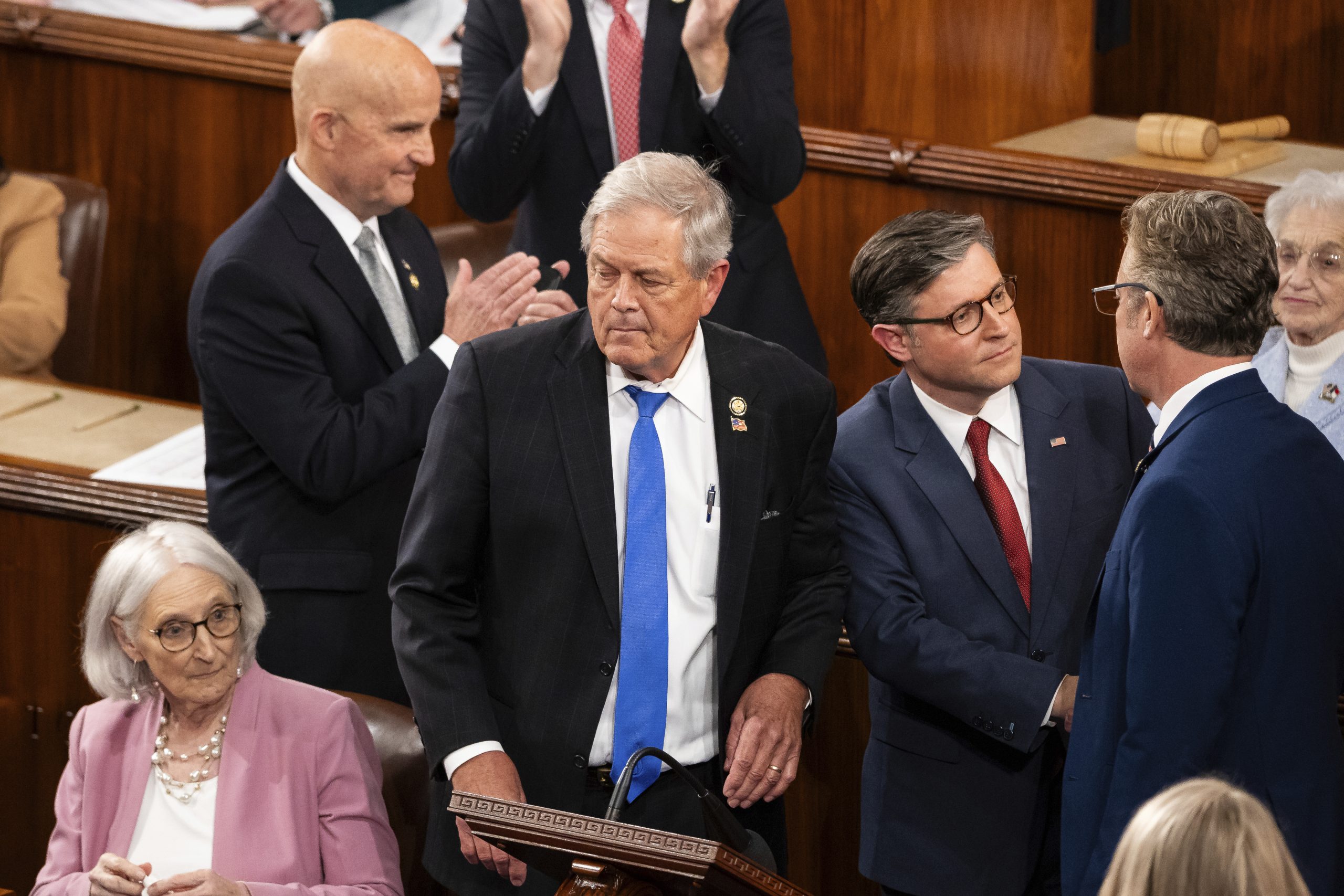House fiscal hawks are looking at the math underlying Senate Republicans’ sprawling domestic policy legislation, and they don’t like what they see.
As Senate Republicans try to muscle President Donald Trump’s “big, beautiful bill” for final passage, they’re on track to violate a budget framework brokered between House fiscal hawks and Speaker Mike Johnson. Under that framework, if the GOP piles on tax cuts over $4 trillion, they’d need to match them dollar-for-dollar with additional spending cuts beyond the $1.5 trillion in the House-passed bill.
“The Senate version adds $651 billion to the deficit — and that’s before interest costs, which nearly double the total,” said the House Freedom Caucus in a Monday afternoon post on X. “The Senate must make major changes and should at least be in the ballpark of compliance with the agreed upon House budget framework.”
It’s a wonky hill to die on, but dozens of House conservatives insisted on the deal before smoothing the megabill’s path through their chamber. Johnson at one point told the conservatives they could go after his gavel if he didn’t hold up the deal — what some of the holdouts considered a “blood oath.”
If the House hawks stand by the deal and the Senate bill doesn’t change appreciably during the final amendment vote marathon that got underway Monday, it could force GOP leaders to “conference” the legislation between the two chambers — likely delaying the bill’s passage beyond Trump’s deadline of July 4.
Now compounding concerns for House GOP leaders, who have ordered members back to Washington to start voting on the bill Wednesday morning, billionaire Elon Musk sent new volleys of criticism at Trump’s marquee legislation Monday over the bill’s deficit impact.
“Every member of Congress who campaigned on reducing government spending and then immediately voted for the biggest debt increase in history should hang their head in shame!” said Musk on X on Monday. “And they will lose their primary next year if it is the last thing I do on this Earth.”
The House fiscal hawks have been crystal-clear about their fiscal red lines, though many now privately worry that they could end up getting jammed by Senate Republicans — and by Trump — with a far spendier bill. Johnson on Monday would not address whether the pending Senate bill could pass the House but told reporters he’s long advised Senate GOP leaders to hew as close to the House version as possible.
There’s “a lot of game left to play,” he added.
Notably, a group of 38 House Republicans led by Rep. Lloyd Smucker (R-Pa.) wrote Senate Majority Leader John Thune in early June warning that any changes to the GOP megabill needed to adhere to the fiscal framework laid out by the House. Under that plan, if the GOP includes $4.5 trillion in tax cuts in their bill, then they would need to scrounge up at least $2 trillion in spending cuts.
It’s already looking to be a far cry from what Senate Republicans hope to pass in the coming hours.
According to the Joint Committee on Taxation, the Senate’s plan includes around $4.45 trillion of tax cuts versus the $3.8 trillion in tax cuts passed by the House. But the spending cuts contemplated by the Senate GOP wouldn’t come close to making up the difference, according to the Congressional Budget Office, the other official budget scorer on Capitol Hill.
CBO estimates the Senate plan includes around $1.5 trillion in mandatory spending cuts, but that amount is reduced by around $300 billion in one-time investments in border funding and national security policy.
“The Senate bill is currently out of compliance with the budget framework by $651 billion, which is adjusted for dynamic revenue from higher economic growth,” said Paul Winfree, CEO of the Economic Policy Innovation Center and a top economic official during Trump’s first administration, in a text. “I think it will be very important to get that number closer to $0 to avoid conference.”
Senate Republicans in many ways made steeper cuts to Medicaid than the House, which would have otherwise helped rectify the difference.
But between $200 and $300 billion in spending cuts included in the House-passed bill were knocked out because they didn’t comply with Senate budget rules. The chamber’s parliamentarian, Elizabeth MacDonough, has been in constant talks with Senate Republican and Democratic staff about whether provisions in the legislation are fit for the filibuster-skirting reconciliation process.
“What we’ve been told is somewhere around $250 billion, because I’ve heard $300 and I’ve heard [$200], so I’m gonna split the difference,” said Sen. Markwayne Mullin (R-Okla.) of the sidelined spending cuts.
Mullin added that House Republicans should look at the score of tax cuts under the so-called current policy baseline, which assumes that trillions of dollars of expiring tax cuts would be extended.
“I think it’s up to the House how they want to look at this, because they can go in two different directions,” said Mullin. “If you go underneath current law, then you have a deficit. If you go into current policy, you actually have a surplus of $507 billion.”
Still, prominent Republicans such as Budget Chair Jodey Arrington (R-Texas) and conservative firebrand Rep. Chip Roy (R-Texas) have argued that Senate Republicans still need to do the math as laid out in the House budget, regardless of which baseline they use.
Rep. Keith Self, another Texas Republican, wrote Monday on X that senators are “completely ignoring” the House budget framework. “This isn’t just reckless,” he wrote, “it’s fiscally criminal.”
Meredith Lee Hill contributed to this report.
